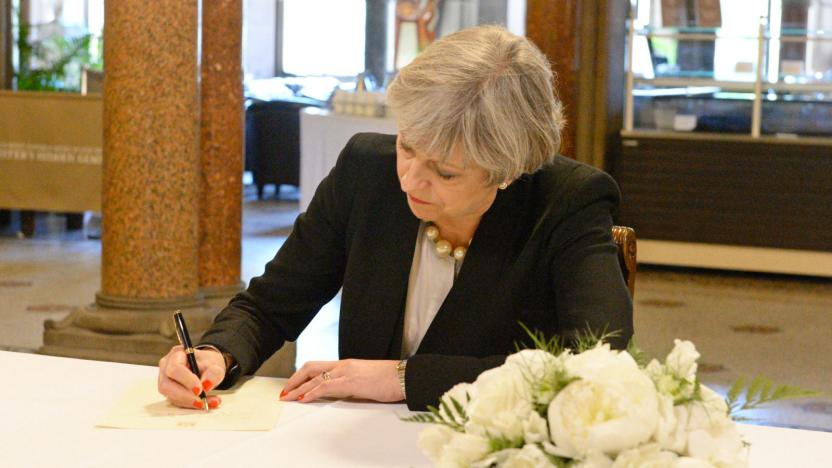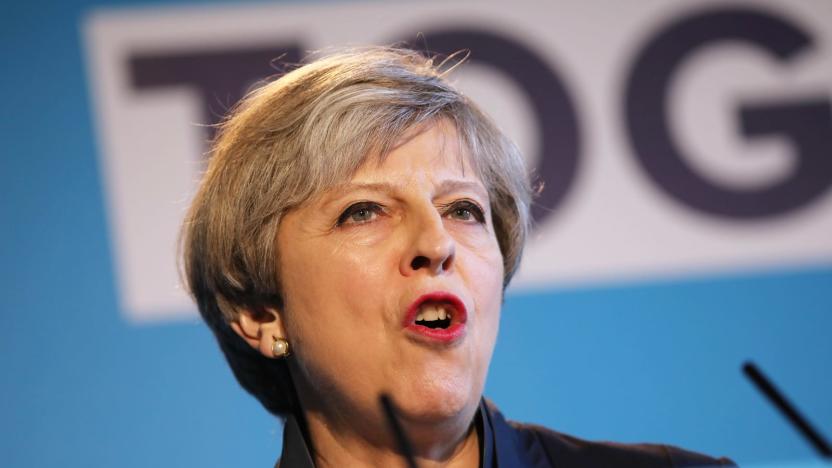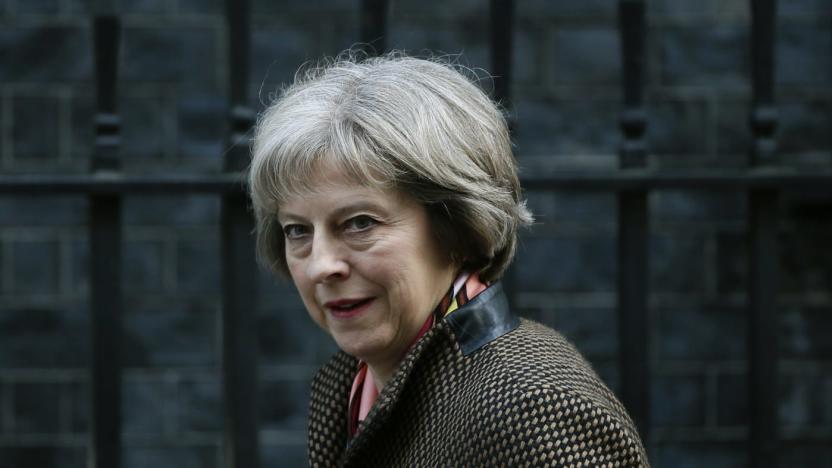theresamay
Latest

The UK Prime Minister is creating an anti-fake news squad
In its most benign form, fake news can simply be clickbait designed to get eyes on banner ads. In other instances -- the one's governments are primarily concerning themselves with -- it's propaganda designed to invoke outrage and sway public opinion on elections and other important decisions. UK Prime Minister Theresa May has previously accused Russia of "seeking to weaponize information" by "deploying its state-run media organizations to plant fake stories and photoshopped images in an attempt to sow discord in the west and undermine our institutions." And now, she's taking action by creating a new specialist unit tasked with actively tackling fake news. What we're not being told, however, is how this anti-misinformation squad is supposed to do that exactly.

Queen's Speech 2017: What it means for UK tech
The General Election has been and gone, but questions remain regarding the suitability of Theresa May as Britain's premier. Nonetheless, as part of traditional ritual, MPs have once again descended upon the House of Lords for the reading of the Queen's Speech, where Her Majesty details the formal plan for the current government. Brexit and Britain's security were the banner announcements, but technology also played a key part, with driverless cars and spaceports the notable inclusions.

Theresa May wants to force tech giants to curb extremist content (updated)
British Prime Minister Theresa May called on global leaders at the G7 conference in Sicily to force internet and social media companies stop the spread of terrorist content available online. "Make no mistake: the fight is moving from the battlefield to the internet," she said in a statement. May called on companies to develop tools to automatically identify and remove extremist materials, block the users who post it and report such activity to the authorities. The Prime Minister also announced the creation of an international forum to encourage industry leaders to share information and technologies to curb the spread of terrorist content. In addition, May proposed that regional governments cooperate by returning and prosecuting foreign fighters via improved "intelligence-sharing, evidence gathering and bolstering countries' police and legal processes. The Guardian's Anushka Asthana reported on Twitter that May's initiatives have the backing of President Trump, as well.

What the Conservative election manifesto means for UK tech
Strong and stable. Strong and stable. Strong and stable. Following Labour and the Liberal Democrats, the Conservative party has put forward its manifesto for the UK general election in June. Many of its 86 pages focus on strong leadership, a strong economy (are you getting the picture?) and the need for a "smooth, orderly" exit from the European Union. A large chunk, however, is also dedicated to science and technology, and how the government would support research, technical training and fledgling startups. In fact, the government considers "fast-changing technology" to be one of five key pillars essential to its success in the next parliament.

Review concludes UK bulk surveillance powers are necessary
Prior to the UK's Investigatory Powers Bill being voted through the House of Commons in June, the surveillance legislation faced criticism from several top Labour MPs. Former Home Secretary and now Prime Minister Theresa May was able to get the Labour Party on board, due in large part by agreeing to an independent review of bulk powers provided in the bill. These allow security and intelligence agencies to collect large amounts of data in various, untargeted ways -- putting the haystack before the needle. David Anderson QC, a respected authority on this type of legislation, has now published his review, providing the opinion that bulk powers are useful and fundamentally necessary.

Home Secretary submits to review of bulk surveillance powers
In an attempt to get the Labour Party on board with the Investigatory Powers Bill, Home Secretary Theresa May has committed to an independent review of the bulk powers it affords law enforcement and intelligence agencies. The controversial surveillance legislation is currently being debated in parliament, but it needs broad support if it's ever going to make it into law. That's not something Labour MP and Shadow Home Secretary Andy Burnham is willing to do without "significant improvement" to the bill.

Labour party says redrafted surveillance bill needs work
The UK government is trying to push through a new piece of surveillance legislation, despite facing strong opposition from technology companies and the intelligence community. Following a cross-party investigation, the Home Office has issued a redrafted bill -- but little has changed, and the Labour Party says it still needs "significant improvement." In a letter to the home secretary Theresa May, Andy Burnham MP has asked for a stronger definition of Internet Connection Records (ICRs). With these, investigators could access the basics of your online communications -- the who, when, where and how of a particular conversation on WhatsApp, for instance.

Everything you need to know about the redrafted IP Bill
The Investigatory Powers Bill, which is set to become the UK's new, consolidated piece of surveillance legislation, was first introduced in draft form late last year. After fielding the thoughts and concerns of telecoms providers, major tech firms, intelligence specialists, privacy advocates and many more invested parties, a trio of Parliamentary committees reviewed and ultimately criticised the draft bill. Taking the red pen of the committees on board, the Home Office has revised the draft and yesterday submitted the IP Bill Mark II to Parliament. Mostly, it just tries to clarify a few of the more ambiguous proposals, but it also expands certain powers rather than reining any in.

Parliamentary committee finds UK snooping bill too vague
The Joint Committee on the Draft Investigatory Powers Bill is preparing to lay out its concerns and recommendations for the new surveillance legislation, following its final evidence session with primary author, Home Secretary Theresa May. The committee's report will fuel further debate on several controversial powers, but the government's Science and Technology Committee has also been keeping a close eye on proceedings. Today, that committee published its own findings on the IP Bill, urging the Home Office to provide greater clarity on some of the proposals, and to further consider the cost and feasibility of data-gathering systems.
![[Image credit: Christopher Furlong via Getty Images]](https://s.yimg.com/uu/api/res/1.2/_EzeROcpRSYDdwY3O78RaQ--~B/Zmk9ZmlsbDtoPTQ2ODtweW9mZj0wO3c9ODMyO2FwcGlkPXl0YWNoeW9u/https://o.aolcdn.com/dims-shared/dims3/GLOB/crop/5450x3380+0+0/resize/1400x868!/format/jpg/quality/85/https://o.aolcdn.com/hss/storage/midas/f2dd10e4ac56ff7ad2d18b6038de6fac/203266961/491520548.jpg.cf.jpg)
Home Secretary leaves plenty unanswered after IP Bill debate
At its heart, the Investigatory Powers Bill aims to give law enforcement and government agencies the means and powers to access Brits' online communications to aid their investigations. The bill's joint committee, whose job it is to scrutinise the legislation, has for several months been consulting with ISPs, mobile operators, tech companies, legal professionals, intelligence experts, privacy groups and other stakeholders. The last of these public evidence sessions took place on Wednesday, with Home Secretary Theresa May, the author of the IP Bill and long-time advocate of expanding the government's surveillance capabilities, being quizzed by the committee. While May attempted to provide some clarity on ambiguous parts of the bill and address concerns raised in previous sessions, plenty of uncertainty remains.

UK Investigatory Powers Bill: what you need to know
The UK government has put forward a bill today that forces internet service providers (ISPs) to keep a record of the websites their customers have visited for up to 12 months. These "internet connection records" (ICRs) could then be requested by law enforcement, security and intelligence agencies to identify which services a person or device has been accessing. It would not reveal every webpage they've browsed -- the current understanding, as set out in David Anderson's recent review of surveillance laws, is that it would cover google.com or bbc.co.uk, but nothing beyond the first forward slash.

UK wants internet providers to identify who's using their connections
The British government isn't letting up on its desire to track internet activity in the name of fighting terrorism. UK Home Secretary Theresa May is proposing a bill that would require internet providers to keep tabs on who's using a given internet protocol (IP) address and hand it over to the police, who could theoretically use it to hunt down suspects. Full details aren't available yet, but there would be some accountability involved. Police would have to get permission before collecting IP address info, and there would be documentation showing both when and why they needed that data.




